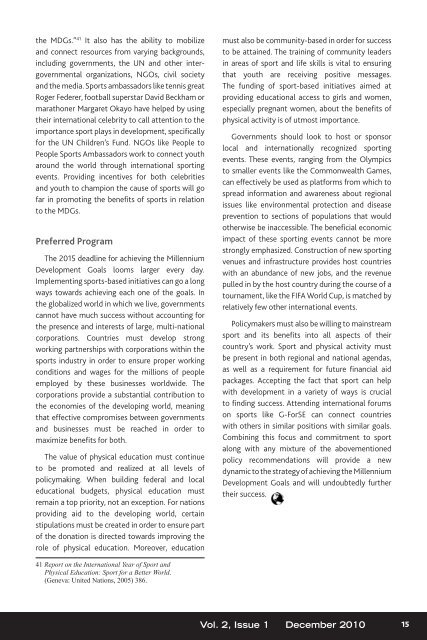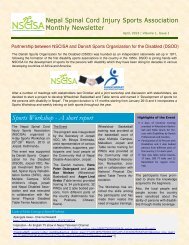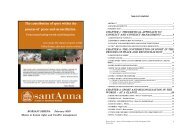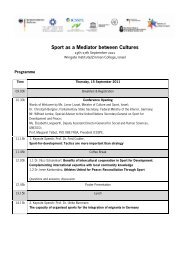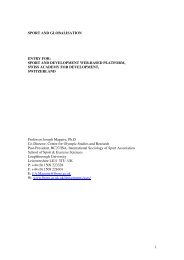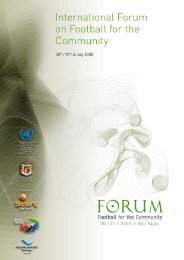Journal of the Martin School of International Studies
Journal of the Martin School of International Studies
Journal of the Martin School of International Studies
You also want an ePaper? Increase the reach of your titles
YUMPU automatically turns print PDFs into web optimized ePapers that Google loves.
<strong>the</strong> MDGs.” 41 It also has <strong>the</strong> ability to mobilize<br />
and connect resources from varying backgrounds,<br />
including governments, <strong>the</strong> UN and o<strong>the</strong>r intergovernmental<br />
organizations, NGOs, civil society<br />
and <strong>the</strong> media. Sports ambassadors like tennis great<br />
Roger Federer, football superstar David Beckham or<br />
marathoner Margaret Okayo have helped by using<br />
<strong>the</strong>ir international celebrity to call attention to <strong>the</strong><br />
importance sport plays in development, specifically<br />
for <strong>the</strong> UN Children’s Fund. NGOs like People to<br />
People Sports Ambassadors work to connect youth<br />
around <strong>the</strong> world through international sporting<br />
events. Providing incentives for both celebrities<br />
and youth to champion <strong>the</strong> cause <strong>of</strong> sports will go<br />
far in promoting <strong>the</strong> benefits <strong>of</strong> sports in relation<br />
to <strong>the</strong> MDGs.<br />
Preferred Program<br />
The 2015 deadline for achieving <strong>the</strong> Millennium<br />
Development Goals looms larger every day.<br />
Implementing sports-based initiatives can go a long<br />
ways towards achieving each one <strong>of</strong> <strong>the</strong> goals. In<br />
<strong>the</strong> globalized world in which we live, governments<br />
cannot have much success without accounting for<br />
<strong>the</strong> presence and interests <strong>of</strong> large, multi-national<br />
corporations. Countries must develop strong<br />
working partnerships with corporations within <strong>the</strong><br />
sports industry in order to ensure proper working<br />
conditions and wages for <strong>the</strong> millions <strong>of</strong> people<br />
employed by <strong>the</strong>se businesses worldwide. The<br />
corporations provide a substantial contribution to<br />
<strong>the</strong> economies <strong>of</strong> <strong>the</strong> developing world, meaning<br />
that effective compromises between governments<br />
and businesses must be reached in order to<br />
maximize benefits for both.<br />
The value <strong>of</strong> physical education must continue<br />
to be promoted and realized at all levels <strong>of</strong><br />
policymaking. When building federal and local<br />
educational budgets, physical education must<br />
remain a top priority, not an exception. For nations<br />
providing aid to <strong>the</strong> developing world, certain<br />
stipulations must be created in order to ensure part<br />
<strong>of</strong> <strong>the</strong> donation is directed towards improving <strong>the</strong><br />
role <strong>of</strong> physical education. Moreover, education<br />
41 Report on <strong>the</strong> <strong>International</strong> Year <strong>of</strong> Sport and<br />
Physical Education: Sport for a Better World.<br />
(Geneva: United Nations, 2005) 386.<br />
must also be community-based in order for success<br />
to be attained. The training <strong>of</strong> community leaders<br />
in areas <strong>of</strong> sport and life skills is vital to ensuring<br />
that youth are receiving positive messages.<br />
The funding <strong>of</strong> sport-based initiatives aimed at<br />
providing educational access to girls and women,<br />
especially pregnant women, about <strong>the</strong> benefits <strong>of</strong><br />
physical activity is <strong>of</strong> utmost importance.<br />
Governments should look to host or sponsor<br />
local and internationally recognized sporting<br />
events. These events, ranging from <strong>the</strong> Olympics<br />
to smaller events like <strong>the</strong> Commonwealth Games,<br />
can effectively be used as platforms from which to<br />
spread information and awareness about regional<br />
issues like environmental protection and disease<br />
prevention to sections <strong>of</strong> populations that would<br />
o<strong>the</strong>rwise be inaccessible. The beneficial economic<br />
impact <strong>of</strong> <strong>the</strong>se sporting events cannot be more<br />
strongly emphasized. Construction <strong>of</strong> new sporting<br />
venues and infrastructure provides host countries<br />
with an abundance <strong>of</strong> new jobs, and <strong>the</strong> revenue<br />
pulled in by <strong>the</strong> host country during <strong>the</strong> course <strong>of</strong> a<br />
tournament, like <strong>the</strong> FIFA World Cup, is matched by<br />
relatively few o<strong>the</strong>r international events.<br />
Policymakers must also be willing to mainstream<br />
sport and its benefits into all aspects <strong>of</strong> <strong>the</strong>ir<br />
country’s work. Sport and physical activity must<br />
be present in both regional and national agendas,<br />
as well as a requirement for future financial aid<br />
packages. Accepting <strong>the</strong> fact that sport can help<br />
with development in a variety <strong>of</strong> ways is crucial<br />
to finding success. Attending international forums<br />
on sports like G-ForSE can connect countries<br />
with o<strong>the</strong>rs in similar positions with similar goals.<br />
Combining this focus and commitment to sport<br />
along with any mixture <strong>of</strong> <strong>the</strong> abovementioned<br />
policy recommendations will provide a new<br />
dynamic to <strong>the</strong> strategy <strong>of</strong> achieving <strong>the</strong> Millennium<br />
Development Goals and will undoubtedly fur<strong>the</strong>r<br />
<strong>the</strong>ir success.<br />
Vol. 2, Issue 1 December 2010 15


